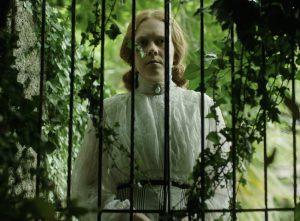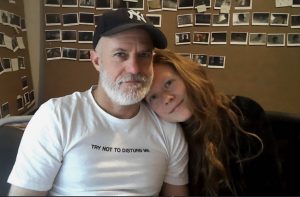The Reel Review
During a late 1800s summer visit to a remote country estate, a doctor isolates his wife to bed rest in the upstairs nursery, believing it will cure her bout of postpartum depression. With no other stimulation, her condition actually worsens, and she starts to imagine that a woman is trapped behind the room’s peculiar-looking yellow wallpaper, in this adaptation of the chilling 1892 semi-autobiographical short story from Charlotte Perkins Gilman.

Filman’s novella was intended as an indictment of the male-dominated era, which treated women as mindless, fragile objects who were driven to “slight hysterical tendency” due to a lack of mental stimulation outside of the home. It is told from the perspective of an unreliable, emotionally unstable protagonist whose physical and mental isolation actually worsens her mental illness. Alexandra Loreth, who also co-wrote the screenplay with director Kevin Pontuti, gives a convincing, claustrophobic performance. The film’s discordant trumpet score heightens the tension.

Unfortunately, the problem with The Yellow Wallpaper is its unimaginative screenplay. It takes such a literal approach to the source material that we get very little context, nor do we really get inside the mind of the depressed main character to experience the supernatural aspects of her illness or even gain insight into her increasingly warped perspective. It’s a real missed opportunity. The result is a well-produced but poorly paced, tedious film that leaves the viewer voyeuristically watching a crazy person literally crawl around and peel wallpaper from the wall without much insight as to why.
REEL FACTS

• Alexandra Loreth and Kevin Pontuti are the creative forces behind Hysteria Pictures. In addition to acting and writing, Loreth is operations manager for a film production company and Pontuti is Chair of the University of Pacific’s Department of Art, Media, Performance and Design.
• Now days, postpartum depression is treated through a combination of therapy and medication, typically anti-depressants. Women who experience postpartum depression are at greater risk of developing major depression later in life.

• Ironically, The Yellow Wallpaper author Charlotte Perkins Gilman, the niece of abolitionist and Uncle Tom’s Cabin author Harriet Beecher Stowe, in 1908 wrote an article in the American Journal of Sociology revealing herself as a racist who called for reinstating slavery of Black Americans.



